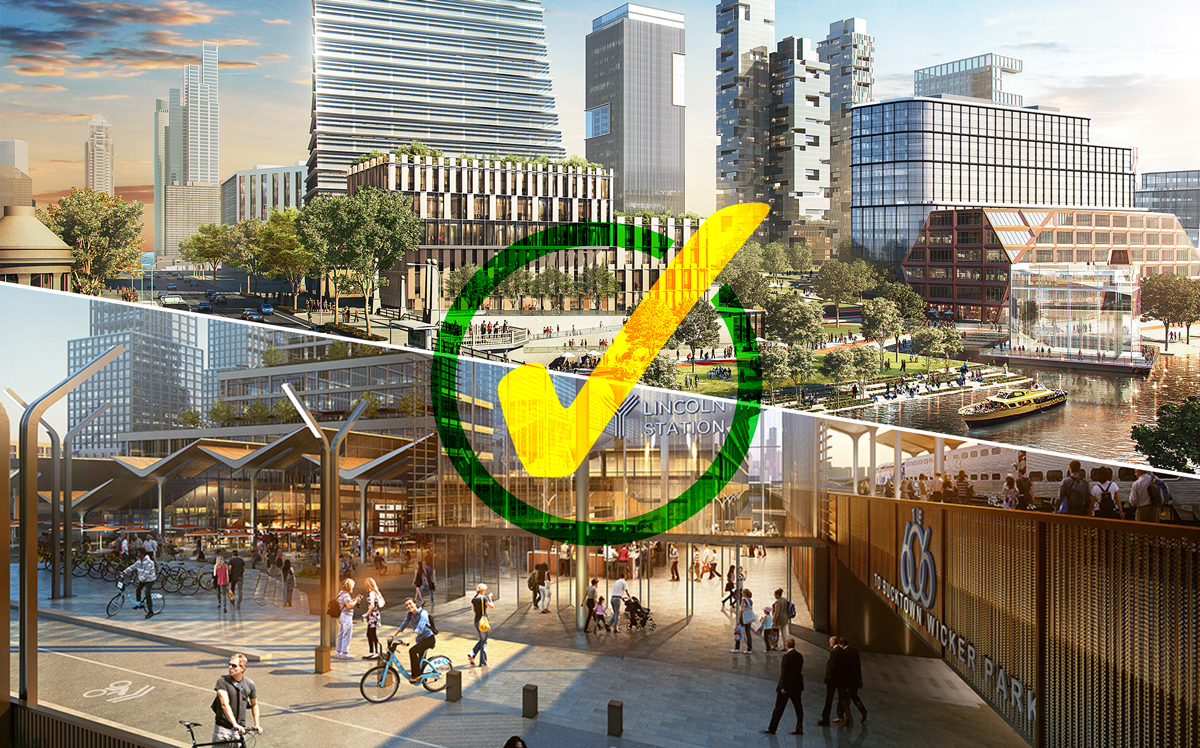Trending
It’s official: Sterling Bay and Related get final ‘go’ sign for Lincoln Yards, The 78
Alderman voted to create two tax increment financing districts around the project sites, clearing the way for work to begin

It took until nearly the last possible moment, but Mayor Rahm Emanuel and his allies in the City Council managed to drag Related Midwest and Sterling Bay’s skyline-shifting proposals for The 78 and Lincoln Yards across the finish line.
The City Council voted Wednesday to create two tax increment financing districts that could raise up to $2.4 billion for infrastructure around the sites of Lincoln Yards and The 78. The vote closed the book on a contentious nearly year-long city approval process for both massive projects, sealing a crucial piece of Emanuel’s legacy before he leaves office next month.
Together, the planned developments could add up to 16,000 residential units and more than 10 million square feet of office, retail and hotel space on the Near North and Near South sides of the city. Both endeavors are expected to take at least a decade to fully materialize.
The new TIF districts had been thrown into flux earlier this week, when Mayor-elect Lori Lightfoot called for a delay in their approval.
But late Tuesday, Lightfooot announced she and Emanuel had reached a deal to allow the controversial public financing plan to move forward.
After “productive meetings” with representatives of Related Midwest and Sterling Bay, Lightfoot said both developers agreed to increase minimum hiring requirement for minority-owned and women-owned contracting firms.
“These changes represent a vital sign that my administration will be able to make progress toward an equitable and fair deal for our communities,” Lightfoot said in a statement.
City leaders already had given both megaprojects full planning and zoning approval, following a bumpy months-long public approval process.
Alderman Brian Hopkins (2nd), whose ward includes the Lincoln Yards site, has aggressively lobbied for the $1.3 billion Cortland/Chicago River TIF, saying Sterling Bay’s master plan relies on the funding stream.
He defended the mammoth proposal one last time before the council voted.
“This development will subsidize the city of Chicago,” Hopkins said. “24,000 permanent corporate jobs will come to the city because of this, and 10,000 union construction jobs will last at least 10 years, and put our people to work as we build this contaminated toxic wasteland into the city of the future.”
Retiring Alderman Danny Solis (25th), whose ward encompasses The 78 site, has not appeared in public since court documents implicated him in a corruption scheme. Alderman-elect Byron Sigcho-Lopez has called for the approval process to be delayed until he takes office.
Both Related Midwest president Curt Bailey and Sterling Bay CEO Andy Gloor celebrated the end of the marathon approval deliberations in separate statements on Wednesday afternoon.
“Today’s approval marks an important milestone in the creation of Chicago’s next great neighborhood,” Bailey wrote. “We’re excited to put thousands of Chicagoans to work and contribute more than $40 billion in economic activity to the city over the next 30 years.
In his own statement, Gloor said he was “thrilled to bring this project to fruition,” saying it will “bring tens of thousands of jobs for Chicagoans and much-needed economic development to an underutilized and underdeveloped area.”
The city’s Community Development Commission advanced the plan on Feb. 5 to create the 141-acre Roosevelt/Clark TIF district, which would divert future tax growth around the site of The 78 to fund up to $700 million in public infrastructure projects, plus another $400 million in potential interest payments. Two weeks later, the same body voted to approve the 168-acre Cortland/Chicago River TIF, which could generate up to $1.3 billion for infrastructure around the Lincoln Yards site during the next 23 years.
The city now has more than 130 TIF districts, including one created last year to benefit Jaffe Companies’ $58 million Edens Collection shopping center on the city’s Northwest Side.
Tax increment financing has come under intense scrutiny from critics like Alderman Scott Waguespack (32nd) and former Cook County Clerk David Orr, who say the funding stream lacks transparency and can allow tax dollars to directly fund private development. But Emanuel and city planning department commissioner David Reifman have staunchly defended the use of TIF districts, saying they could unlock tens of billions of dollars in development that would not otherwise not be possible.
Waguespack joined Downtown Alderman Brendan Reilly (42nd) and 11 other aldermen in voting against the new TIF districts Wednesday. Alderman Pat Dowell (3rd), whose ward borders The 78 site, voted against both TIFs.
Waguespack again criticized the projects before the vote, saying, “lies and deception have been built into (Lincoln Yards) since day one.”
He encouraged his newly-elected and re-elected colleagues to revisit the redevelopment agreements after next month and “make them better for taxpayers.”




